
Bhutan marked the golden jubilee of its membership in the United Nations (UN) this year. Bhutan was formally admitted as the 128th member state of the UN in September 1971. Commemorating this, the Prime Minister paid tribute to Their Majesties The Kings for the visibility and goodwill that Bhutan has earned, as a responsible and credible member of the international community.
The partnership between the UN and Bhutan has grown over the decades with collaborations expanding into a diverse range of fields contributing to Bhutan’s development goals.
“The roles and responsibilities of the UN are also becoming equally more challenging. On that front, I would like to let you all know my personal realisation. That the impacts of climate change and the impacts of the global pandemic have taught us a lesson, a lesson that is very undoubted that we are all inter-dependent on each other. No nation, no individual can progress without the support of the other. So on this front, I urge all the leaders that it is only correct and is morally correct to be offering unconditional support to the platform created by the UN,” said Dr Lotay Tshering, the Prime Minister.
The UN resident coordinator reaffirmed their commitment to work together for a self-reliant, innovating and sustainable Bhutan.
“In 1973, the UN supported the country with human development and provided special skill training to civil servants. This was one of the first programmes rolled out by the UN in Bhutan. As we mark the 50 years of partnership, the UN continues to commit to developing the capacity of not only its civil servants but also of the CSOs. The UN will continue to strengthen our partnership with Bhutan for we know partnering is the life goal of great development,” said Gerald Daly, the Resident Coordinator at UN Bhutan.
As part of the event, it also launched the Bhutan SDG Funding Programmes which aims to facilitate the development and implementation of critical building blocks towards an Integrated National Financing Framework, a transformative contribution to the way Bhutan finances its development priorities. This includes supporting financing solutions aligned with both responses to COVID-19 and longer-term investments in a sustainable future.
Samten Dolkar






